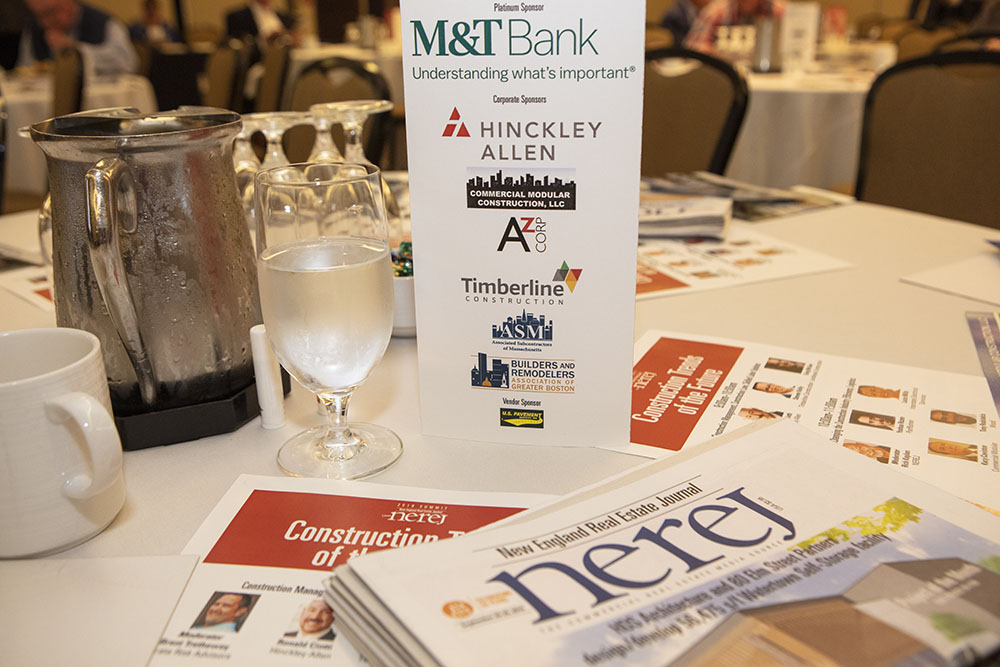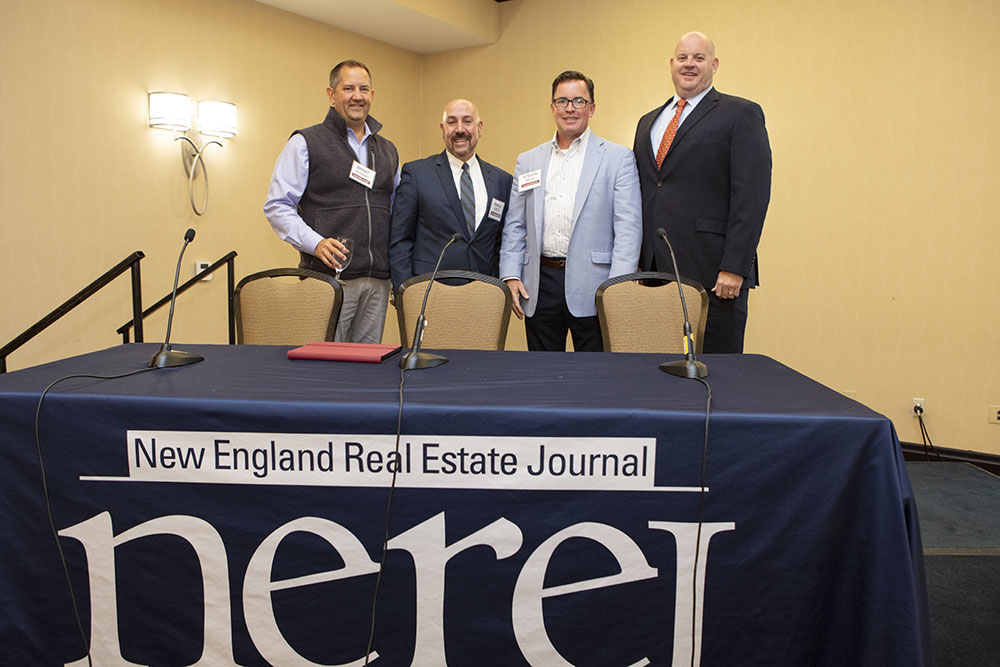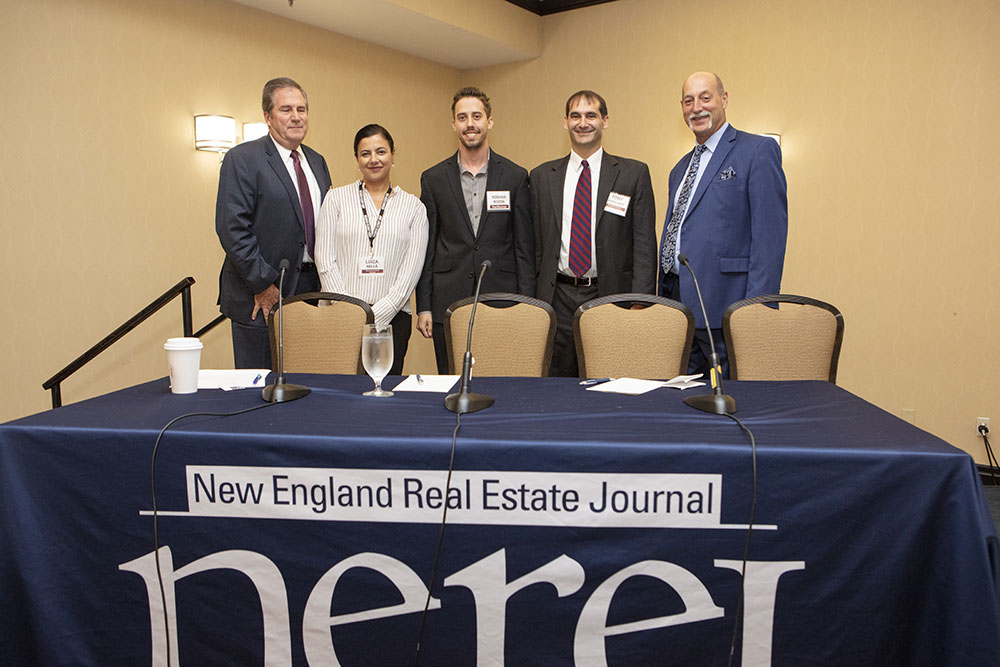New England Real Estate Journal hosts Construction Trends of the Future Summit on September 19th

Needham, MA The New England Real Estate Journal (NEREJ) held their Construction Trends of the Future Summit on September 19th at the Sheraton Boston Needham Hotel at 100 Cabot St.
The first panel was held from 9 – 10 a.m. and was moderated by Brent Trethewey of Licata Risk Advisors. Speakers included: Ronald Ciotti of Hinckley Allen; Steven Kelly of Timberline Construction; and Greg McGee of Lendlease Construction. Topics included: Construction management, construction law and skilled labor updates.
Trethewey began the discussion asking the panel about the recent challenges facing the construction industry. The biggest factor is the lack of supply and labor.
Kelly pointed out with the new Millennial generation, staying time at a job is around 18 months. To keep an employee now, they are looking into the culture of a company. “Are they committed to a sustainable Earth? Are they socially responsible? We at Timberline, have invested to really re-change how we work. It’s really about building our business plan now to accept and change and adjust to the Millennial generation,” he said.

Ronald Ciotti of Hinckley Allen; Steven Kelly of Timberline Construction;
and Greg McGee of Lendlease Construction.
From a legal standpoint, Ciotti added his opinions on challenges in the industry. With the lack of labor, “We are seeing improper workmanship. Seeing more litigation spanning from projects not finishing on time.
Another trend he is seeing is the adaptation of technology “Right now, we can utilize technology to make up for some of that labor shortage.”
One of the areas that are prevalent in other parts of the country, and slowly making its way to New England is modular and prefabrication. “What is happening with this is that you can build cheaper, better, more efficiently and much more safely,” Ciotti said.
In order to come up with a solution to the labor shortage, McGee said, “As an industry, we have to figure out how to partner with the best in the business.” Their company, Lendlease Construction, partners with Autodesk.
The next topic Trethewey brought to the panel was tariffs and how it is impacting costs.
Ciotti noted that we are in a very volatile time period. Within the industry, there is price volatility. Raw material prices skyrocket with the mention of tariffs. He gave advice to contractors on how to avoid getting stuck. First, they should use a cost analysis, along with a generous contingency, and you can pass down to suppliers to lock in prices.
When asked how they can streamline scheduled productivity in a tight, skilled labor market, McGee said, “Prefab has changed. It is now a standard. Things that are cutting edge technology today, in five years, will be the standard, so you have to make that jump.”
Kelly said, “The construction industry has come a long way with adapting to technology. Some examples are: Building Information Modeling (BIM); use of drones; web-based construction and shared platforms.”
In regards to sustainability Kelly shared his knowledge on how the industry needs to cut down on the carbon footprint. According to Data Analytics, by the year 2070, we are expecting a 42-inch sea level rise on the East Coast. There will be mandates for the commercial real estate industry, and once enforced, it will cost companies billions if not followed.
Closing comments regarding future trends were positive for the city of Boston and regions such as Cambridge, Back Bay and Middlesex 3. Kelly has seen a lot of growth in the city of Boston. It was named the science and technology capital of the world. McGee also echoed that the life science/lab market is popular and will continue.
The second panel was held from 10 – 11 a.m. and was moderated by Rick Kaplan of NEREJ. Speakers included: Yoshua Rozen of PartRunner; Luiza Mills of Interstate Electrical Services; Kacy Caviston of Commercial Modular Construction; and Tony Rodolakis of Wood Environment & Infrastructure Solutions. Topics included: Technology changing the construction industry, efficiency and logistics.

Luiza Mills of Interstate Electrical Services; Yoshua Rozen of PartRunner; Tony Rodolakis of Wood
Environment & Infrastructure Solutions; and moderator Rick Kaplan of NEREJ.
Kaplan asked the panel about how technology Is changing the construction industry. Mills said, “Change is inevitable. Finding the right tools that make sense for an organization to proceed to the next level are very valuable and critical. Interstate uses construction lien methodologies. It is also very important to value assess themselves internally. Another tool is empowering of the do-ers within the function. Technology needs to be used to its capacity.”
Rozen explained what a gig economy is and how his company, PartRunner is helping the construction industry with moving materials from supply houses to jobsites. Independent helpers help aide the construction industry with existing problems, whether it’s helping subcontractors or new projects or suppliers. “Gig economy has to do with services such as Uber, Lyft, Postmates, where individuals can tap into a network or a system and work on their own hours and manage their own schedules whenever they want,” he said.
Rodolakis spoke about PFAS substances. It is a family of chemicals used as a waterproofing agent, firefighter foams and food packaging. Because they are used so widespread, they have been found in drinking water across the country. Over the last 9 months, they have found these chemicals are carcinogenic. It is now impacting the construction industry. He said, “One of those impacts is any solid waste or soil from a site or property where PFAS may have been used, are now getting rejected by landfills.” PFAS are typically not regulated under general construction standards. He suggested companies need to do due diligence. The primary tool for that is a Phase 1 ASTM Environmental Site Assessments.
Caviston spoke in length regarding modular construction and how it is trending right now. Modular construction is the complete unit. For example there are modular bathrooms for hotels, or modular elevators for buildings etc… “A modular building comes completely wired, plumbed, sheetrocked, windows, doors installed, and they line up to form a building or a structure, and we are seeing them being used more in the multifamily industry, hospitality industry, and senior living-type facilities.”
He noted that over the last 50 years, the construction industry has declined in worker productivity, therefore prefabrication and modular construction will help increase that number and help the industry become more cost effective and more competitive.
Final thoughts on new technology and trends the industry will be seeing in the future include: Ecommerce, prefabrication and implementation of software.
The New England Real Estate Journal would like to thank the following sponsors for this event:
Platinum Sponsor: M&T Bank
Corporate Sponsors: Hinckley Allen; Commercial Modular Construction, LLC; Timberline Construction; A/Z Corp.; Builders and Remodelers Association of Greater Boston; and Associated Subcontractors of Massachusetts.
Vendor Sponsor: U.S. Pavement Services, Inc.
For the full Summit schedule, visit www.nerej.com/summits. For more information or speaking/sponsor opportunities, please contact Rick Kaplan at rkaplan@nerej.com or call 781-878-4540.
Jennifer Tempesta is an editor for the New England Real Estate Journal, Norwell, Mass.
Atlantic Property Management expands facilities maintenance platform: Assigned two new facility management contracts in RI


Unlocking value for commercial real estate: Solar solutions for a changing market - by Claire Broido Johnson

Connecticut’s Transfer Act will expire in 2026. What should property owners do now? - by Samuel Haydock

Tenant Estoppel certificates: Navigating risks, responses and leverage - by Laura Kaplan


 (1).png)







 (1).png)
